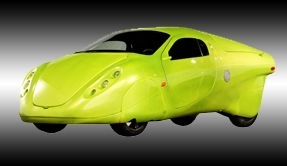Christopher McKitterick's Blog, page 49
September 30, 2010
Astro-Porn of the Day2: Gliese 581g, or Earth-Like Exoplanet Discovered!

Click the image to see the story. NOTE: The thing about Atlantis and Vanguard might not be true.
"New Earth," as the Vanguardians call it, is only one of two new planets discovered orbiting the nearby red dwarf star, named Gliese 581 by Earth-humans. This brings the tally of known planets around this star to 6, the most yet discovered in a planetary system other than our own. As in our Solar System, the planets around Gliese 581 have nearly circular orbits, though 581g (the Earth-like one) has an orbital period (aka "year") of only 37 days - in really close for good ol' Sol, who'd burn it to a crisp, but Gliese 581 is a feeble red dwarf star, so it's comfortably warm and has, I'm sure, the most amazing sky of any Earth-like planet, being so close to its parent. Its mass indicates that it is probably a rocky planet with a definite surface and that it has enough gravity to hold on to an atmosphere. Because it's tidally locked (doesn't rotate), the 581g-ans who live on the side facing away from the sun live in cyberpunkey perpetual night, gambling their lives against AI overlords. And stuff.
Money shot: "The fact that we were able to detect this planet so quickly and so nearby," sez Steven Vogt, who leads the Lick-Carnegie Exoplanet Survey (shut up your inner 12-year-old), "tells us that planets like this must be really common. If these are rare, we shouldn't have found one so quickly and so nearby," Vogt said. "The number of systems with potentially habitable planets is probably on the order of 10 or 20 percent, and when you multiply that by the hundreds of billions of stars in the Milky Way, that's a large number. There could be tens of billions of these systems in our galaxy."
Tens of billions of Earth-like planets in our galaxy, alone. Ponder that.
Here's the paper.
We live in amazing times!
Chris
Astro-Porn of the Day: Jupiter and Io dance

Click the image to see more Jupiter photos by AztecastroMcJ on Flickr.
It was a bit of a pain to adjust both altitude and azimuth every few seconds to keep Jupiter and its mini planetary system in the eyepiece's field of view, but I pulled up a stool and just nudged it as needed. Just like the old days, before battery-powered, satellite-sensing, cylon-scopes took over.
Right now, Jupiter is so darned bright that I used filters to see if one might improve the view (partially by dimming it, partially by filtering out too-bright colors), and indeed the Mars filter brought out a huge variety of textures and colors in Jupiter's stormy atmosphere. But I ended up preferring the warm, natural colors of my favorite planet sans filter in a William Optics 33mm Swan mega-eyepiece (about the size of a small telescope). The Baader Planetarium 17mm Hyperion eyepiece provided a pretty kick-ass view at twice the magnification, but having to adjust every second or three inspired me to use the big, low-power unit instead.
I couldn't identify the high-contrast dark spot on the face of Jupiter - alien vessel? asteroid strike? - but figured it must be one of its Galilean satellites. When I got back inside, a quick search found this super-neat applet to find the position of Jupter's moons, and discovered I was, indeed, right - it was Io. To see the Jovian system as I saw it during the transit, set the time to 06:30 (when I first captured Jupiter) through 07:00 (when Jupiter started grazing the treetops in my back yard) at -5 time offset. What an AWESOME tool! Want to know which moons you're seeing on a particular night, or plan your viewing for during an occultation or transit? Check out this page first.
Okay, now the super-excited is wearing off a little and the sleepy is hitting. G'night, and clear skies!
Chris
September 17, 2010
the "Edison2" wins the Automotive X Prize!

Click the image to see the story.
The competition had a lot of requirements, including that competitors need to achieve at least 100mpge; this means "equivalent to 100mpg of liquid fuel," so if you use a straight-up electric, it needs to use the kWh equivalent to 100mpg of gasoline. They also had to be production-capable, well-performing, low-emissions, and safe. Many of the competitors will be available soon to consumers. So cool!
The Edison2 was the overall winner of $5 million, but there were two other winners. Li-Ion Motors took home $2.5 million in the Alternative Side-by-Side Class:

Click the image to see the story.
And the X-Tracer won the $2.5 million Alternative Tandem Class:

Click the image to see the story.
If vehicles like these are in our future, I foresee personal transportation will remain personal, even in a post-oil world.
Chris
BOOK LAUNCH!
Friday, November 5, 4:00pm - 5:30pm at the KU Bookstore (the store formerly known as "Oread Books," where we hold the signings and readings for the Campbell Conference).
Reception afterward, with details TBA. Need to pick a place for the party!
Woohoo!
Chris

September 15, 2010
Astro-Porn of the Day: Jupiter at closest approach

Click the image to see the story about Jupiter's close approach.
Jupiter: god of the planets, banded by atmospheric streamers whipping the cloud-tops at hundreds of miles per hour in opposite directions, resulting in amazing storms - including the famous Great Red Spot and now the Little Red Spot as seen in this photo:

Click the image to see the story about the Little Red Spot.
We'll not be as close to this mighty planet until 2022, so get out there and look for it! If it stops storming sometime over the next few days, I'm thinking of doing an astronomy camp-out and spending some quality time with my favorite planet.
Chris
"Tea Party" victories in the Republican primaries.
So this is just the opposite of what the press is making of it: Tea-Party primary victories mean fewer Do-Nothing-Know-Nothing seats. It's a good day in politics!
Chris
September 3, 2010
Greaserama this weekend!
Boulevard Drive-In
theater in Kansas City, Missouri each Labor Day weekend. If you're in the area and love cars, don't miss it!
I just finished writing up my gallery from last year; click here to see it. Here's a fine example of the kind of rod you'll see there:

Click the image to see the story.
And of course there's lots of crazy stuff, too:

Click the image to see the gallery.
I'll be there - will you?
Chris
August 27, 2010
Astro-Porn of the Day: The Eye Is Ever Watchful
Well, actually, this is a first light adaptive optics image from the NST at the Big Bear Solar Observatory in California. "With a 1.6-meter primary mirror, the NST is the largest solar telescope in the world," says observatory staff Nicolas Gorceix. "It has realtime correction for atmospheric distortion [aka "adaptive optics"], so we can see things in very high resolution - as small as 65 km wide on the Sun. For perspective, Earth is slightly smaller than the whole sunspot including the dark umbra and the daisy petal-like penumbra. The spot is surrounded by the Sun's ubiquitous granular field," which shows the boiling surface of the Sun.
Check it out:

Click the image to see the story.
Welcome back, sunspots!
Chris
August 18, 2010
jeans test: win!
It's been boiling hot (or in Silvergoth's - a Seattle friend - words, "hellish") here in Kansas since June, so I haven't had the opportunity to wear proper pants for a few months (except for dressy pants during the Campbell Conference). Thus this was my first opportunity to pull on a pair of pants since spring semester.
Remember how I've been working out kinda seriously since spring? It began with an effort to strengthen my shoulder post-accident and has continued with renewed vigor because I like the results overall. The newest result: My jeans, once tight, now need a belt to keep from falling off.
Woohoo! I'll post another photo and proper health-post when I have some more time.
Now off I go on my pretty Vespa, half an hour into the wilds of North Lawrence.
Chris
Stories from a perilous youth #2: "Chris Learns to Fly."
 I must have been about 13 when I decided to build a hang-glider. I mean, who doesn't want to fly? I subscribed to Popular Mechanics magazine, and in the back were various and sundry black-and-white ads for plans to build everything from water purifiers to go-karts to ultralight helicopters, so surely it was within an adolescent boy's reach to make a hang-glider in the garage while his parents were off at work, right? I mean, it's just a big kite. I loved kites, even made myself a box-kite once. So I set out to build myself a hang-glider. I was going to fly! How hard could it be?
I must have been about 13 when I decided to build a hang-glider. I mean, who doesn't want to fly? I subscribed to Popular Mechanics magazine, and in the back were various and sundry black-and-white ads for plans to build everything from water purifiers to go-karts to ultralight helicopters, so surely it was within an adolescent boy's reach to make a hang-glider in the garage while his parents were off at work, right? I mean, it's just a big kite. I loved kites, even made myself a box-kite once. So I set out to build myself a hang-glider. I was going to fly! How hard could it be?
Even back then in the Paleozoic, one could easily find dimensions and designs for such devices (far more modern and safe than the bi-wing shown in the photo), so I set out to find suitable materials to build my own aircraft. Fourteen-foot wingspan? Check! Cross-frame skeleton? Check! Tensioned upper and lower struts? Check! I even made a control bar from which I would hang and lean to steer the craft by the maze of control wires attaching the bar to the framework above.
I should clarify a bit: As I was a kid working with zero budget, the materials weren't exactly up to FAA standards. So rather than aircraft-grade aluminum tubing, I used scrap wood trim from a house under construction in the neighborhood. Similarly, rather than rip-stop nylon for the sail, I used clear plastic sheeting - also construction leftovers. Control bar? Wooden dowel. Control wires? Twine, as was the harness. And everything was held together with tape and staples. The height of 13-year-old engineering and manufacturing skills. Seemed plenty sturdy in the back yard!
A couple of friends were more than willing to help me haul it up the steep hillside near my house. I lived in a little neighborhood about two miles from Ortonville proper (western Minnesota, almost in South Dakota), so once we climbed up from the forested neighborhood, this was all grassland - until one reached the top of the hill, where the golf course (of last story's fame) lived at an altitude of about 500 feet above the river valley. Windy, too, across the road and above the trees: The perfect spot to catch an updraft, thought I. So up we trudged, a friend supporting each wingtip while I carried the craft from its center. It was reasonably light, seeming especially so whenever a breeze tried to snatch it from our fingers. (There's a bit of foreshadowing: This lightweight construction would prove to be its undoing.)
We reached the top of the hill and turned around to prep for launch. It was a warm, breezy June afternoon, pillowy clouds gliding past the sun, all manner of trees swaying in the breeze far below, Big Stone Lake huge and dark just a few blocks away, busy road between me and all that pretty valley stuff. Insects buzzing and all that. Probably a hawk soaring majestically overhead. I should note that this is exactly the worst launch point for gliding that I could have found, but, hey, we were too young to drive, and what did we know?
So I cranked up my courage and nodded to my friends, then started running downhill with them helping balance the wings. Almost instantly, the wind yanked me and my huge kite out of their hands as my feet left the ground. I was flying! It took off skyward nose-first, and if I hadn't been so busy thinking, "Holy crap! I'm flying!" I would have tried to keep from such a steep climb. Within seconds, the glider had rocketed upward nearly 10 feet... while at the same time the hill fell away even faster, as it was pretty steep. I think I laughed aloud, though I was pretty busy trying to figure out how to steer by shifting my weight.
But all was not Pepsi and bubblegum: The same helpful wind that dragged me skyward also applied pretty serious torque to the wooden skeleton and simple fasteners that comprised the structure of my aircraft. Just as I began to steer, I heard a mighty crack, and almost as soon as that sound registered as sub-optimal, I was Icarus, slain by hubris. Down we fell, wings folding upward where the cross-brace cracked and twine tore loose of its moorings; down, down, plastic sheeting flapping in the wind like some great, prehistoric, dying bird. The hard back of the unforgiving ground rose up to meet us, but I was falling too fast to land gracefully on such a steep slope. What followed was a tumbling and cracking and crumpling as hang-glider wrapped its arms around me - its staple-studded arms, broken and full of slivers and lengths of entangling twine as the sail tore free and engulfed me like a blanket. A blanket embroidered with countless pointy bits. Because I carried a good deal of momentum and we were on a long slope, we rolled like that for what felt like hours before coming to a stop at the lip of a drop-off overlooking the road.
I couldn't really move at this point, bound and bloodied as I was within my ruined flying machine, but I lived! And I had flown! What were a few (hundred) bruises and cuts? I had flown in my own home-made hang-glider!
Not that I've repeated this adventure, mind you. But someday I'll fly again. Just maybe with better materials. Or perhaps in a flying machine made by professionals.
Christopher McKitterick's Blog
- Christopher McKitterick's profile
- 31 followers



